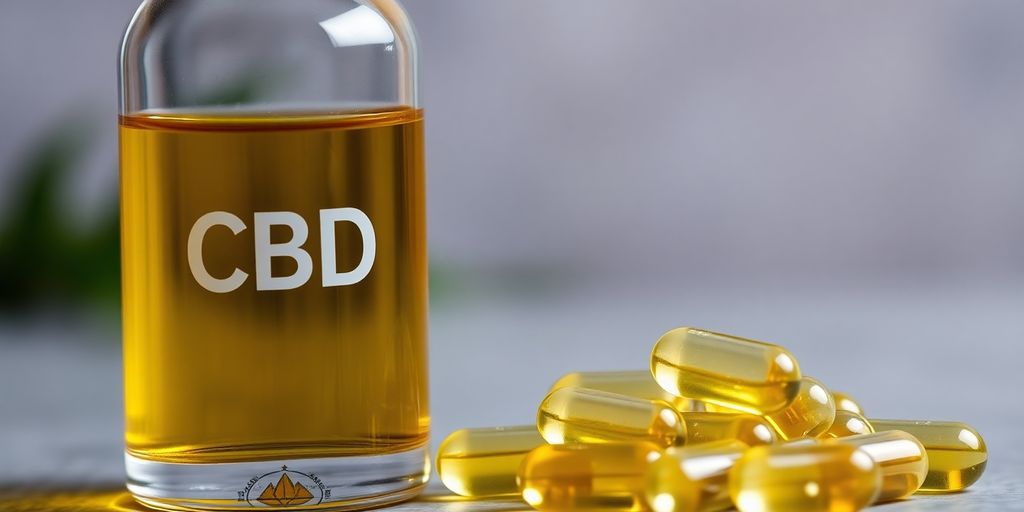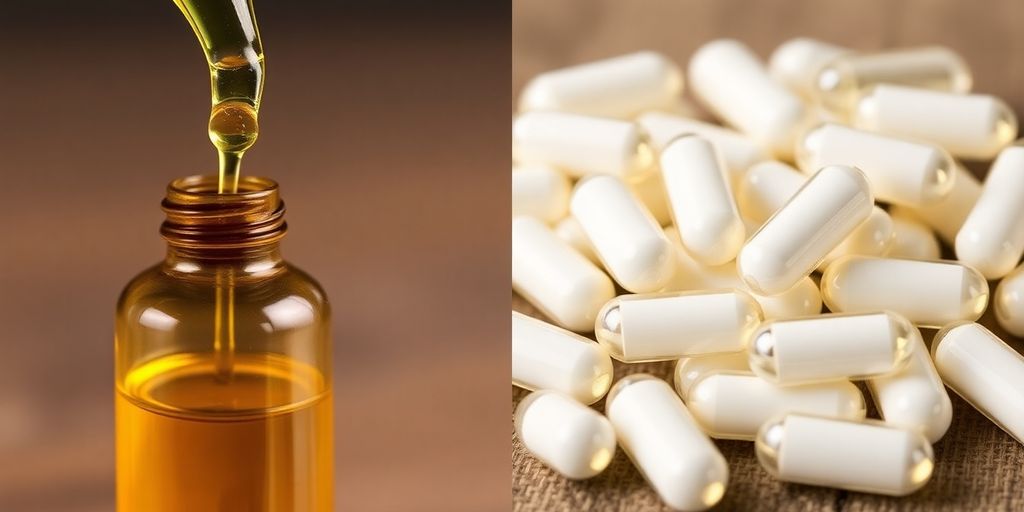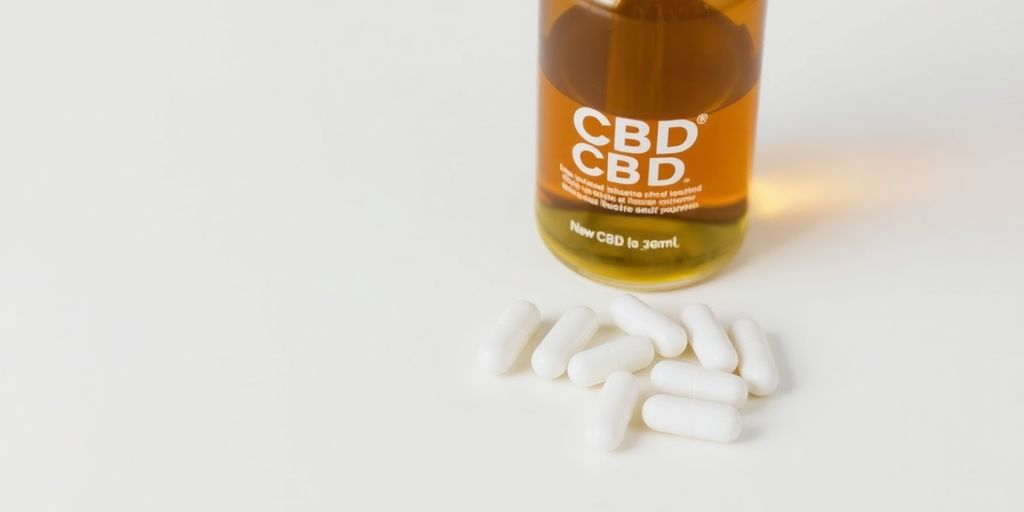- 4 Oct 2025

Thinking about trying CBD but not sure if oil or capsules are the way to go? It’s a common question, and honestly, the world of CBD can feel a little confusing at first. Both oils and capsules offer different ways to get CBD into your system, and understanding how they work and what makes them different is key to finding what fits your wellness routine best. We’re going to break down CBD oil vs capsules, looking at what goes into them, how they’re made, and what you should keep in mind when picking one out. Let’s figure this out together.
Key Takeaways
When you’re looking into CBD products, you’ll quickly notice there are different ways to get your CBD. The two most common forms you’ll see are CBD oil and CBD capsules. While they both deliver CBD, they aren’t quite the same, and knowing the differences can help you pick what works best for you.
Think of it like this: CBD oil is like a liquid supplement you can add to things or take directly. It’s pretty flexible. You can put a few drops under your tongue, mix it into your morning smoothie, or even add it to a face mask. This flexibility means you can control the dose pretty precisely, drop by drop. On the other hand, CBD capsules are more like your standard vitamin or pill. You just swallow one with water, and you’re done. It’s super straightforward and doesn’t require any measuring or mixing. This makes them really convenient if you’re on the go or just prefer a no-fuss approach.
The main difference between CBD oil and what’s often called ‘cannabis oil’ really comes down to what’s inside. CBD oil is specifically made to have a lot of CBD, which is a compound from the cannabis plant that doesn’t make you feel high. It usually comes from hemp plants, which naturally have very little THC, the compound that does cause that high feeling. So, with CBD oil, you’re getting the CBD without the buzz.
Cannabis oil, however, is a bit different. It’s typically made from marijuana plants, which have more THC. While it might also have CBD, the higher THC content is what sets it apart and is responsible for the psychoactive effects. Sometimes, cannabis oil also contains a wider range of other compounds from the plant, like other cannabinoids and terpenes. People talk about this as the ‘entourage effect,’ where all these parts might work together. The specific mix of compounds affects how the oil might work and also where it’s legal to use.
Both types of oil come from the cannabis plant, but how they’re made can vary. CBD oil is usually extracted from hemp plants. These plants are naturally high in CBD and low in THC. The extraction process, often using CO2 or oils, aims to get as much CBD as possible while leaving out other stuff. The goal is a CBD-rich product with minimal THC.
Cannabis oil, on the other hand, is extracted from marijuana plants, which have more THC. The methods are similar, like CO2 or ethanol extraction, but the aim is to keep the THC and other cannabinoids. This results in an oil that has those psychoactive effects. Knowing how they’re made helps you understand why they’re different.
When you’re trying to decide between CBD oil and capsules, think about a few things. First, what are you hoping to get out of it? If you want something simple and predictable, like adding a vitamin to your daily routine, capsules are a good bet. They offer a set dose every time, making it easy to keep track. CBD capsules provide a simple, routine-friendly option, similar to taking vitamins or medication.
If you like having more control over your intake or want to use CBD in different ways, like adding it to food or drinks, then CBD oil might be better. CBD oils offer greater versatility, allowing integration into food, drinks, or skincare. You can adjust the amount you take more easily with oil. It really just depends on your personal preference and how you plan to use it. Both have their place, and it’s about finding the right fit for your wellness journey.
The choice between CBD oil and capsules often comes down to personal preference and lifestyle. Capsules offer convenience and precise dosing, fitting easily into a daily routine. Oils provide more flexibility in how they are consumed and allow for finer adjustments to dosage, catering to those who prefer a more hands-on approach to their wellness regimen.

The rules around CBD and cannabis oils can feel a bit confusing, and honestly, they change depending on where you are. It’s not quite as simple as just knowing if it’s legal in your country; you really need to look at the specifics of your state or even your city.
Generally speaking, CBD oil derived from hemp, which has very little THC, is legal in a lot more places. Think most of the US, the UK, and many European countries. But, and this is a big but, you still need to double-check the local laws. Some places have their own rules about how much THC is allowed, even if it’s just a tiny bit. For example, in some US states, CBD oil is legal as long as it contains less than 0.5% THC. It’s a good idea to know the exact limits in your area to stay on the right side of the law. If you’re looking for products with a bit more THC, like those that might offer a fuller experience, then you’re likely looking at cannabis oil. This type of oil is legal in US states that have legalized marijuana for medical or recreational use. However, it’s still against federal law in the US. In the UK, cannabis oil is considered a controlled substance because of its THC content, making it illegal to buy or possess unless you have a specific medical prescription. Always verify the specific regulations in your location before purchasing or using any cannabis-derived products.
When you’re trying to figure out the regulations, it really comes down to the THC content. CBD oil, especially when it’s made from hemp, is generally more accepted legally. The key is that it must have very low levels of THC. For instance, in the UK, a CBD product is considered legal if it contains no more than 1 mg of THC per item, and that THC can’t be easily separated from the rest of the product. If it meets these standards, it’s classified as being made from ‘hemp,’ not ‘cannabis,’ and is perfectly fine to buy and use there. Capsules and oils often fall under the same legal umbrella, but the source material and its THC concentration are what regulators focus on. It’s important to remember that even if CBD oil is legal, the way it’s marketed and sold can still be regulated. You might see restrictions on health claims, for example. So, while the substance itself might be permitted, how it’s presented to consumers is also part of the legal picture. Staying informed about these details helps you make sure you’re using these products correctly and legally.
The legal status of cannabis products is a complex and evolving area. What’s permitted in one jurisdiction might be strictly prohibited in another. Understanding these differences is key to responsible use and avoiding legal trouble. Always prioritize checking the most current laws applicable to your specific location.
When you’re looking into CBD, you’ll hear a lot about the “entourage effect.” It’s basically the idea that all the different compounds in the cannabis plant, like cannabinoids and terpenes, work together. Think of it like a band – each instrument plays its part, but together they make a richer sound. This is what happens with full-spectrum CBD products.
Full-spectrum CBD products contain a wide range of cannabinoids, including CBD, CBG, CBN, and even small amounts of THC (legally below 0.3%). They also include terpenes, which are the compounds that give cannabis its smell and flavor, and are thought to have their own wellness benefits. The theory is that all these components working together create a more powerful effect than CBD alone. People often say they feel a more complete sense of relief or balance when using full-spectrum products. It’s like getting the whole package deal from the plant.
On the flip side, you have CBD isolate. This is the purest form of CBD, stripped of everything else. We’re talking 99% pure CBD, with no other cannabinoids, no terpenes, and definitely no THC. If you’re someone who wants to avoid THC completely, or if you just prefer a straightforward CBD experience, isolate is the way to go. It’s often flavorless and odorless, making it super easy to add to whatever you like, whether that’s a drink or a homemade edible. It’s a clean, simple approach to using CBD.
Here’s a quick look at the main differences:
| Feature | Full Spectrum CBD | CBD Isolate |
| Cannabinoids | Multiple, including trace THC | Only CBD |
| Terpenes | Present | Absent |
| Entourage Effect | Yes | No |
| Purity | Less than 99% CBD | 99% pure CBD |
| THC Content | Trace amounts (legally compliant) | None |
Choosing between full-spectrum and isolate really comes down to what you’re looking for in your wellness routine. Some people find the synergy of full-spectrum works best for them, while others prefer the simplicity and purity of isolate. It’s all about personal preference and what makes you feel your best.
Let’s get into the nitty-gritty of CBD oil. It’s a popular choice for many people looking for wellness support, and understanding what it is really helps.
So, what exactly is CBD? It stands for cannabidiol, and it’s one of over a hundred different compounds, called cannabinoids, that come from the cannabis plant. Now, the big thing to know is that unlike THC (tetrahydrocannabinol), CBD doesn’t make you feel ‘high.’ That’s a pretty important distinction for a lot of folks.
Our bodies actually have something called the endocannabinoid system. Think of it as a network that helps manage things like your mood, how you sleep, and even pain. CBD seems to interact with this system, which is why people are interested in its potential wellness benefits. CBD oil itself is usually made from hemp, which is a type of cannabis plant that has a lot of CBD but very little THC. This setup lets people get the potential benefits of CBD without the psychoactive effects.
Making CBD oil starts with growing hemp. Once the hemp is harvested, it goes through a process to get the CBD out. There are a few ways this is done:
After the CBD is extracted, it’s usually cleaned up and tested to make sure it’s good quality and pure. This finished oil is what you find in all sorts of products, from little dropper bottles to vape liquids. While research is still ongoing, early studies and what people report suggest CBD oil might help with a few things. It’s good to remember, though, that CBD oil isn’t a magic cure for anything, and it’s not meant to treat medical conditions.
It’s always a good idea to talk to a doctor before you start using CBD, especially if you have any health concerns or are taking other medications. They can help you figure out if it’s right for you and what might be a good starting point.
We’re still learning a lot about CBD, but its non-psychoactive nature makes it a really interesting option for people interested in natural wellness.
CBD oil benefits can be quite varied, and understanding how it’s made is a big part of choosing the right product for your needs.

When you’re looking into CBD or cannabis oils, it’s easy to get lost in all the different options. But really, the most important thing to think about is the quality of what you’re buying. It makes a big difference in how well it works and if it’s even safe to use.
Think about it like this: you wouldn’t want to use something that has pesticides or other junk in it, right? Good quality oils come from plants grown without yucky chemicals. They’re also made using methods that keep all the good stuff intact and don’t leave behind anything harmful. Plus, the best companies get their products tested by outside labs to make sure they’re pure and have the right amount of cannabinoids. If a company isn’t open about how they make their products or doesn’t show you lab results, it’s probably best to steer clear.
So, how do you find these good quality products? Start by looking at the brand. Do they seem honest about where their hemp or cannabis comes from? Do they talk about their extraction process? A company that’s upfront about these things is usually a good sign. Check out what other people are saying about them too. Lots of positive reviews can tell you a lot.
There are a lot of myths out there about CBD and cannabis oils, and some of them can lead you to buy bad products. For example, not all CBD oils are the same. Some might be weak, others might have stuff in them you don’t want. Just because something costs a lot doesn’t automatically mean it’s the best, either. And remember, if you’re using CBD oil from hemp, it shouldn’t make you feel high. If it does, it might have too much THC or it could be a fake product.
Be careful of products that promise miracle cures or make wild health claims. CBD and cannabis oils can be helpful for some people, but they aren’t magic fixes. They work best when they’re part of a healthy lifestyle, not as a replacement for medical care.
So, you’ve been reading up on CBD oils and capsules, trying to figure out what’s best for you. It’s a lot to take in, right? We’ve talked about how they’re made, what’s inside them, and even the legal stuff. Now, let’s bring it all together so you can feel good about the choices you make for your wellness.
Think of it like this: oils are pretty straightforward. You put a few drops under your tongue, and it gets into your system pretty quickly. Capsules, on the other hand, are like little time-release packages. They go through your digestive system, which takes a bit longer, but the effects can last longer too. It really just depends on what you’re looking for. Do you want fast relief, or something that works steadily over hours?
Here’s a quick look:
Knowing these differences is the first step. But don’t stop there. Always check out the brands you’re considering. Look for companies that are open about where their hemp comes from and how they extract the CBD. They should also have third-party lab results available – this is super important for making sure the product is what it says it is and is free from yucky stuff.
Choosing the right CBD product isn’t just about picking a bottle off the shelf; it’s about understanding what goes into your body and how it might affect you. Take your time, do your homework, and trust your gut. Your wellness journey is unique, and the products you choose should support it in the best way possible.
Ultimately, the best choice is the one that fits your lifestyle and helps you reach your personal wellness goals. Whether it’s oil or capsules, making an informed decision means you’re taking charge of your health. That’s a pretty powerful thing.
So, we’ve talked about how CBD oil and cannabis oil are different. One comes from hemp and usually doesn’t get you high, while the other often comes from marijuana and can have psychoactive effects. It really comes down to what you’re looking for. Think about your own wellness goals and what feels right for you. Always check the laws where you live, too, because things can be different everywhere. And don’t forget to look for good quality products – check those lab reports if you can. Ultimately, knowing the differences helps you pick the best option for your own wellness journey.
CBD oil comes from hemp plants, which have lots of CBD but very little THC. Cannabis oil usually comes from marijuana plants and has more THC. This means CBD oil won’t get you high, but cannabis oil might.
CBD oil is legal in many places because it has very low THC. Cannabis oil’s legality changes a lot depending on where you are because it can have higher THC levels.
Full-spectrum CBD includes many natural compounds from the cannabis plant, like other cannabinoids and terpenes. This is thought to create an “entourage effect” where they all work together. CBD isolate is just pure CBD, with everything else removed.
The best way to know if an oil is good quality is to check if the brand is honest about how they make it. Look for lab results that show what’s in the oil and make sure it’s pure. Good brands will share this info.
CBD oil is made by taking CBD from hemp plants. The most common ways to get the oil are using CO2 or other oils to pull the CBD out. The goal is to get pure CBD without the THC.
You can take CBD oil as drops under your tongue, put it on your skin, or even vape it. Capsules are another easy way to take a set amount. It really depends on what works best for you and why you’re using it.